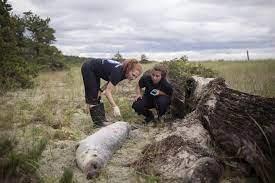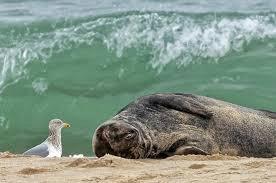 Isolates from dead and stranded seals sampled along the Coast of Maine have yielded H5N1 strain avian influenza virus. This is not an unexpected event given infection in seabirds including gulls. Avian influenza B viruses have previously been isolated from clinically affected and dead seals in the Netherlands.
Isolates from dead and stranded seals sampled along the Coast of Maine have yielded H5N1 strain avian influenza virus. This is not an unexpected event given infection in seabirds including gulls. Avian influenza B viruses have previously been isolated from clinically affected and dead seals in the Netherlands.
The cause of the 2022 outbreak involving 60 recognized cases, three times the usual early summer rate of mortality, was investigated by a team led by the National Oceanic and  Atmospheric Administration and the USDA, leading to the diagnosis.
Atmospheric Administration and the USDA, leading to the diagnosis.
This case demonstrates the ability of the H5N1 strain to infect mammals with recent isolations also recorded from foxes in the U.S., Canada and Japan. Infection of mammals with the avian strain of H5N1 has implications for the virus persisting in diverse reservoir populations and emerging as a potential zoonotic pathogen.